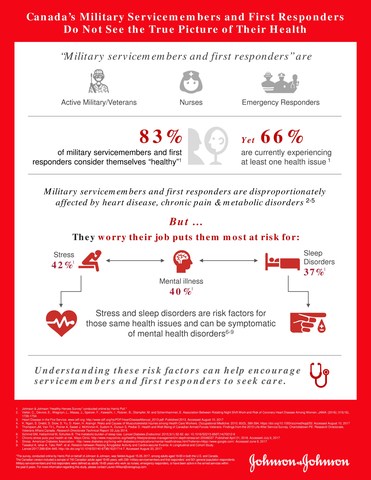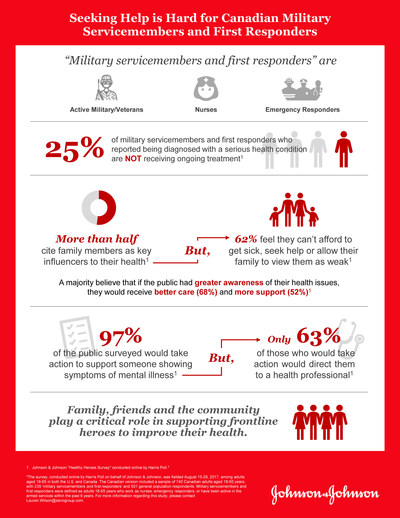Research Shows That Canadian Military Servicemembers and First Responders Struggle to Get Support for Their Own Health Needs Français
People Who Are on The Frontlines of Trauma are Unaware of Their Risk Factors for Serious Health Conditions
TORONTO, Sept. 21, 2017 /CNW/ -- Eighty percent of military servicemembers and first responders believe they are vulnerable to health issues, but many have difficulty seeking and receiving the help they need from doctors, family, friends and the larger community. The Healthy Heroes survey, sponsored by Johnson & Johnson (NYSE: JNJ) and conducted by Harris Poll, queried 239 Canadian military servicemembers and first responders and 501 members of the general public about their knowledge and attitudes related to the health of these frontline heroes.
Stressed, But Otherwise Healthy, They Say
While stress (42%), mental illness (40%), and sleep disorders (37%) are cited as top job-related concerns amongst military servicemembers and first responders, 83% feel they are in good, very good, or excellent health. Still, 66% report at least one serious health issue, including chronic pain, metabolic disorders and heart disease.
Research shows these populations are at risk for several health conditions1-4, however, military servicemembers and first responders do not associate the stress and sleep issues they are reporting as potentially contributing to the chronic conditions for which they are at risk.5-8 According to the Healthy Heroes survey, while three in five military servicemembers and first responders know that stress and sleep disorders (62% and 59% respectively) can impact their overall health, few (25% and 23% respectively) are receiving care for these issues from a healthcare professional.
"It is clear these courageous individuals recognize the stress inherent in their jobs, but they may not necessarily link that stress to the associative risk for other serious health issues -- both psychological and physiological," says Husseini Manji, MD, FRCPC, Neuroscience Head, Janssen Pharmaceuticals. "Of greater concern is that even when these issues are recognized, they are not necessarily being addressed by a healthcare professional. We must all learn how to recognize someone at risk for mental illness to ensure they get the help they need so they can continue to play a vital role at home and in the community."
Seeking Help is Hard
Of the military servicemembers and first responders who reported being diagnosed with a serious health condition, 25% are not receiving ongoing treatment. More than half cite family and their spouse (52%; 51%) as being key influencers to their health, yet many (62%) feel they can't afford to get sick, seek help or allow their family to view them as weak. Many (77%) also believe their family depends upon them to be a strong role model. Furthermore, one in four of these individuals are afraid that their colleagues would not support their efforts to get help with mental health issues.
76% of military servicemembers and first responders say support from peers and the community would encourage them to take better care of their health, but 53% admit their profession makes it difficult to engage in a healthy manner with people who are not in the same line of work.
A majority of military servicemembers and first responders who believe the public should be more aware of their health issues believe it would help them to receive better care (68%) and elicit more support from family, friends and the community (52%). A case in point is that most Canadians surveyed recognize some symptoms of mental health issues and nearly all (97%) would do something to help an individual showing symptoms; however, only 63% would direct them to a healthcare professional.
Johnson & Johnson proudly sponsors the 2017 Invictus Games to honor the bravery of our service men and women, and the families that support them. The company will mobilize its "Donate a Photo" booth throughout the games, benefiting the True Patriot Love foundation which supports Canadian military, Veterans and their families.
"We applaud Johnson & Johnson, and all organizations, that are investing in research and programs that support the health and well-being of military families," said Bronwen Evans, Founding Director and Chief Executive Officer of True Patriot Love Foundation, a national charity which funds more than 100 local organizations across Canada that provide support and resources to military members, Veterans and their families. "We are extremely proud to partner with Johnson & Johnson to empower every Canadian to do their part and be there for the heroes who protect our country and communities."
References:
- Vetter, C., Devore, E., Wegrzyn, L., Massa, J., Speizer, F., Kawachi, I., Rosner, B., Stampfer, M. and Schernhammer, E. Association Between Rotating Night Shift Work and Risk of Coronary Heart Disease Among Women. JAMA. (2016); 315(16), 1726-1734.
- Heart Disease in the Fire Service. www.iaff.org. http://www.iaff.org/hs/PDF/HeartDiseaseManual_2013.pdf. Published 2013. Accessed August 10, 2017
- K. Ngan, S. Drebit, S. Siow, S. Yu, D. Keen, H. Alamgir. Risks and Causes of Musculoskeletal Injuries among Health Care Workers. Occupational Medicine. 2010; 60(5), 389-394, https://doi.org/10.1093/occmed/kqq052. Accessed August 10, 2017
- Thompson JM, Van Til L, Poirier A, Sweet J, McKinnon K, Sudom K, Dursun S, Pedlar D. Health and Well-Being of Canadian Armed Forces Veterans: Findings from the 2013 Life After Service Survey. Charlottetown PE: Research Directorate, Veterans Affairs Canada. Research Directorate Technical Report. 03 July 2014.
- Schmid SM, Hallschmid M, Schultes B. The metabolic burden of sleep loss. Lancet Diabetes Endocrinol. 2015;3(1):52-62. doi: 10.1016/S2213-8587(14)70012-9
- Chronic stress puts your health at risk. Mayo Clinic. http://www.mayoclinic.org/healthy-lifestyle/stress-management/in-depth/stress/art-20046037. Published April 21, 2016. Accessed July 6, 2017.
- Stress. American Diabetes Association. http://www.diabetes.org/living-with-diabetes/complications/mental-health/stress.html?referrer=https://www.google.com/. Accessed June 8, 2017.
- Tawakol A, Ishai A, Takx RAP, et al. Relation between resting amygdalar activity and cardiovascular events: a longitudinal and cohort study. Lancet.2017;389:834–845. http://dx.doi.org/10.1016/S0140-6736(16)31714-7. Accessed August 20, 2017.
About the Study
The survey, conducted online by Harris Poll, on behalf of Johnson & Johnson, was fielded August 15 - 28, 2017, among adults aged 18-65 in both the U.S. and Canada. The Canadian version included a sample of 740 Canadian adults aged 18-65 years, with 239 'servicemembers and first responders' and 501 general population respondents. Servicemembers and first responders were defined as adults 18-65 years who work as nurses, emergency responders, or have been active in the armed services within the past 6 years. For more information regarding this study, please contact [email protected].
About Johnson & Johnson:
Caring for the world, one person at a time…inspires and unites the people of Johnson & Johnson. We embrace research and science - bringing innovative ideas, products and services to advance the health and well-being of people. Our approximately 116,000 employees at more than 250 Johnson & Johnson companies work with partners in health care to touch the lives of over a billion people every day, throughout the world.
SOURCE Johnson & Johnson

Sinead Breen, Zeno Group, Phone: (416) 850-0640; Paloma Feliciano, Johnson & Johnson, Phone: (908) 307-8610


Share this article